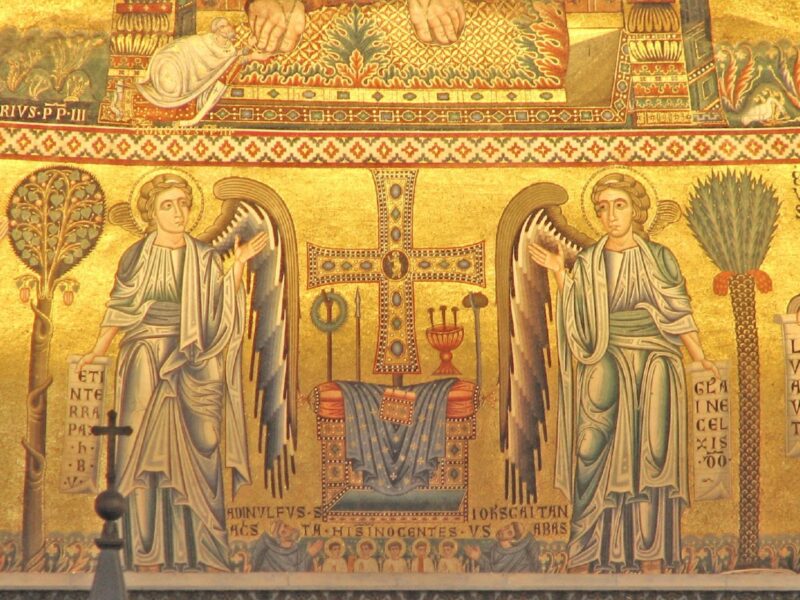
Present to God
Sixteenth Sunday of the Year. Fr John O’Connor invites us to consider how we make space for God in our lives.
‘Martha, Martha, you are anxious and troubled about many things, but one thing is necessary. Mary has chosen the good portion, which will not be taken away from her.’
We all have people and things we care about. And with care can come anxiety. There are people about whom we care deeply; but then we find ourselves worrying about them. We might have a job or role we love, but then we worry about what if something were to go wrong. We care about our security, financial and in other ways; but, even when things are going fine, many still feel insecure.
Anxiety can have its good side – it can be connected to our care for others and for ourselves – and, let’s face it, we can be justified in worrying about others and about the challenges we face. But anxiety can be costly to our inner lives. It can get in the way of prayer. It can also get in the way of our ability to realise the potential of who we most deeply are. It can undermine personal confidence and undermine relationships, introducing distrust and restlessness. Anxiety can have a pervasive impact across pretty much all parts of our lives – practical, moral, and spiritual.
I suspect that these dynamics connected to anxiety lie behind today’s Gospel reading: ‘Martha, Martha, you are anxious and troubled about many things, but one thing is necessary.’
There are three figures – Jesus, Mary, and Martha. There seem to be complex interpersonal dynamics going on, which spills over into breaches of social etiquette and politeness.
Martha, who is getting the food ready without help from Mary, criticises Mary because of the lack of help. We don’t know if Mary lived with her sister, Martha; but Martha certainly expected Mary to help out with the chores.
Then Martha breaks a rule of social etiquette by asking Jesus: ‘Lord, do you not care that my sister has left me to serve alone? Tell her then to help me.’
What Martha is doing here is sometimes called ‘triangulation’ by psychologists: where there is a disagreement between two sides and one of them brings in a third party to take their side and thus tip the balance in their favour. Martha should not have done this to her guest. It’s impolite.
Put on the spot, it’s now Jesus’s turn to take liberties with social etiquette. He tells Martha straight: ‘Martha, Martha, you are anxious and troubled about many things, but one thing is necessary. Mary has chosen the good portion, which will not be taken away from her.’ Martha’s triangulation strategy backfires.
Maybe Martha should have understood Jesus better. After all, Jesus has form when it comes to telling his hosts exactly what he thinks. A few chapters earlier Jesus is at the house of Simon the Pharisee, who criticises Jesus for letting a woman come and anoint his feet and dry them with her hair. But Jesus points out to Simon Peter that at least she looked after him better than Simon the Pharisee did!
A traditional reading of the story of Martha and Mary is that it is about the active and contemplative life – roughly, the difference between someone working in the world and someone living a life dedicated first and foremost to prayer. Since it is Mary who sits at Jesus’s feet who is praised for her single-minded attention to the Lord, and not the relatively busy Martha, a lesson often drawn from this Gospel passage is that the contemplative life is inherently superior to the active life.
There is much in favour of this view. Yet many theologians have contested this interpretation of the Gospel text. Indeed, the medieval Dominican, Meister Eckhart, famously wrote a sermon in which he argued that it is Martha, not Mary, who is the more spiritually advanced!
Perhaps, though, the text is not about contemplation versus the active life at all. Both have their necessary place in our lives and can be seen as mutually complementary. On this view, the Gospel passage presents us with a powerful reminder against getting so bogged down in the heaviness and shackles of anxiety and its related symptoms of perpetual busyness and clutter, with its ability to take our hearts and minds away from what is present right now and from the things that matter most. Martha is so taken up with her anxieties about the meal and about Mary’s behaviour that she fails to be present to Jesus; she unwittingly fails to be a good host and is impolite by putting Jesus on the spot to side with her against her sister.
On this interpretation, the Gospel passage is concerned with the general spirit and dynamics present in both busy activity and the quieter aspects of life. The care worker busy helping the needy, or the employee doing their work with love and care, or the contemplative monk or nun in the silence of the monastery, can all be deeply present to God in their different ways.
No life can be wholly taken over by contemplation: it would not be feasible – even the strictest monastics need to carry out some tasks. But lives can be almost wholly taken over by busyness, with hardly a moment for quiet and contemplation. The price is that we end up living on the surface and dominated by varieties of anxiety whether acknowledged or not. We need a combination of both contemplation and activity, the relative proportions depending on the type of person and the type of life being led.
Let this Sunday’s Gospel reading be an invitation to reflect on the shape of our lives and the dynamics within them; and to open our hearts to the voice of God, so that we might live more truly, able to work for what is good and make space for what is of greatest value.
Readings: Genesis 18:1-10 | Colossians 1:24-28 | Luke 10:38-42
Image: detail from Christ in the House of Mary and Martha by Tintoretto, via Wikimedia Commons (CC BY 4.0)



Rev Neil Hannigan
Many thanks Fr. John. What flows from your sermon is that I like so many do not make space for Jesus, the greatest value of all. {My anxiety levels are palpable to some other people I know}.